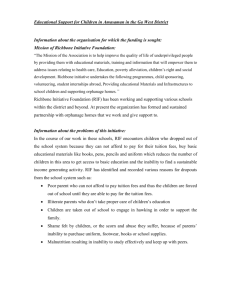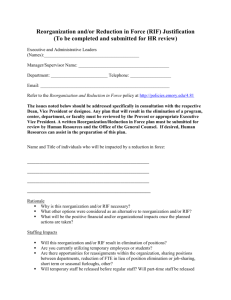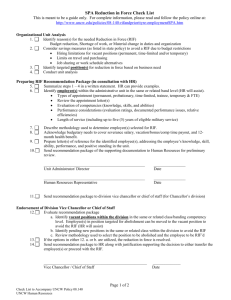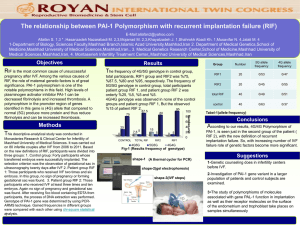B&F Workforce Transition Strategy
advertisement
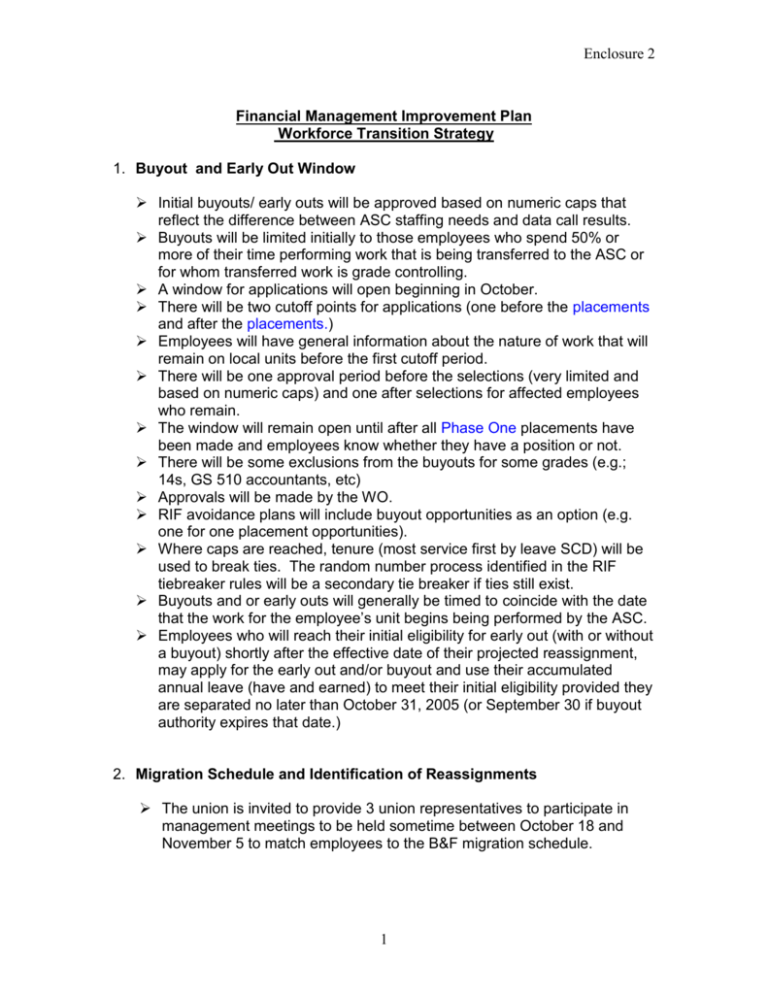
Enclosure 2 Financial Management Improvement Plan Workforce Transition Strategy 1. Buyout and Early Out Window Initial buyouts/ early outs will be approved based on numeric caps that reflect the difference between ASC staffing needs and data call results. Buyouts will be limited initially to those employees who spend 50% or more of their time performing work that is being transferred to the ASC or for whom transferred work is grade controlling. A window for applications will open beginning in October. There will be two cutoff points for applications (one before the placements and after the placements.) Employees will have general information about the nature of work that will remain on local units before the first cutoff period. There will be one approval period before the selections (very limited and based on numeric caps) and one after selections for affected employees who remain. The window will remain open until after all Phase One placements have been made and employees know whether they have a position or not. There will be some exclusions from the buyouts for some grades (e.g.; 14s, GS 510 accountants, etc) Approvals will be made by the WO. RIF avoidance plans will include buyout opportunities as an option (e.g. one for one placement opportunities). Where caps are reached, tenure (most service first by leave SCD) will be used to break ties. The random number process identified in the RIF tiebreaker rules will be a secondary tie breaker if ties still exist. Buyouts and or early outs will generally be timed to coincide with the date that the work for the employee’s unit begins being performed by the ASC. Employees who will reach their initial eligibility for early out (with or without a buyout) shortly after the effective date of their projected reassignment, may apply for the early out and/or buyout and use their accumulated annual leave (have and earned) to meet their initial eligibility provided they are separated no later than October 31, 2005 (or September 30 if buyout authority expires that date.) 2. Migration Schedule and Identification of Reassignments The union is invited to provide 3 union representatives to participate in management meetings to be held sometime between October 18 and November 5 to match employees to the B&F migration schedule. 1 Enclosure 2 3. Transfer of Function for First Unit Only The first unit that reports to the Albuquerque Service Center (ASC) will be covered by an official TOF because a new competitive area will be established and the transferred functions will cease in their entirety in the old competitive area. Some additional individual employees at the grade 14 and above level may be reassigned at the same time as these initial employees move to the new ASC. Employees in the unit being transferred will receive TOF specific notice and, if he or she declines, separation will be proposed for the effective date of the TOF (February 2005). See section 5 for benefits information. 4. Directed Reassignments Parallel TOF Rules While notices regarding TOF or Directed Reassignments will both be given during November, for migrated positions effective after the TOF date, employees will receive directed reassignments. TOF rules regarding method 1 (50% or more of duties plus others where transferred duties are grade controlling) will be used to identify employees to be directed to the ASC. Employees will be reassigned in alignment to their primary activity wherever possible. Some employees may be assigned in other duty areas than their primary area in order to ensure placements of all affected employees. RIF retention register order will be used (most service first) to direct the reassignments of employees in their assigned activity. Declinations of directed reassignments will result in separation notices to be effective the day before the directed reassignment was to become effective. Employees will be notified at least 14 days in advance of the time period when offers will be made. An employee may designate a proxy, but they must do this in writing and at least 7 days in advance of the selection period and be given to their servicing HRO with contact information. Employees will have at least 24 hours from the date of positive contact to accept or decline a directed reassignment to the ASC. Emergency situations that make this response time impossible will be dealt with on a case-by-case basis. The reporting date for directed reassignments will not be less than 60 days from the notification period unless agreed to by the employee. 5. Benefits Associated With Proposed Separations Benefits (such as severance pay for employees not eligible for discontinued service or optional retirement, also ref. CFR 351.606(b)(2)) 2 Enclosure 2 for declining a directed reassignment outside the commuting area are the same as for declining a TOF outside the employee’s commuting area. Separation notices will trigger eligibility for the certification of eligibility under the USDA Career Transition Assistance Plan (CTAP) and the Interagency Career Transition Assistance Plan (ICTAP) placement. Employees in receipt of separation notices for declining a move outside their commuting area will be eligible for RIF avoidance measures on their local units in the period before the effective date of the separation and should a local RIF occur during the notice period, may participate in the local RIF. 6. Delayed Buyout/ Early Outs Buyouts and or early outs will generally be timed to coincide with the date that the work for the employee’s unit begins being performed by the ASC. Employees who will reach their initial eligibility for early out (with or without a buyout) shortly after the effective date of their projected reassignment, may apply for the early out and/or buyout and use their accumulated annual leave to meet their initial eligibility provided they are separated no later than October 31, 2005 (or September 30 if buyout authority expires that date.) 7. Phase Two Staffing After the results of the first round of reassignments are known, the staffing situation for the ASC will be assessed to see if additional employees need to be reassigned. This assessment will include an assessment of unit responses to the data call due date of December 2004. Should additional vacancies exist and units have identified additional positions performing transferred work that they now need to abolish, the Parties agree to review results and negotiate additional placement strategies for affected employees. The parties agree that vacancy announcements may be opened prior to the completion of additional phase two reassignments if any, but merit selections will be made only if no additional lateral placements are needed at that grade level. 8. RIF avoidance Local RIF avoidance measures will begin upon the conclusion of step 4 above. Employees who remain on the list after selections and buyouts / early outs are completed will be included in local RIF avoidance activities. Management will prepare a package of information (for management) to capture the ideas about options and how-to material for the RIF avoidance 3 Enclosure 2 part of the workforce strategy to promote consistency of practice within the local units. The following list is a list of some of the options available for inclusion in the package: o Local Pre-WRAPS or WRAPS o Buyouts/ Early Out (1:1) o Opportunities offered to employee to take voluntary changes in tour and voluntary downgrades o Modification of qualifications o Retraining of employees o Outplacement efforts (Career Transition Assistance Plan and other efforts) Management will give strong direction to units regarding the need to document how they seriously considered costs associated with RIF, severance pay, etc. against the cost of other RIF avoidance options. In any RIF approval process, there will be a step to review documented RIF avoidance measures taken and an assessment of its adequacy before any RIF authority will be granted. 9. Employee Informational Briefings The parties agree that informational briefings and packages will be made available to B&F employees prior to any TOF or directed reassignments so that employees are aware of the options that are available to them and can make informed decisions. 4
